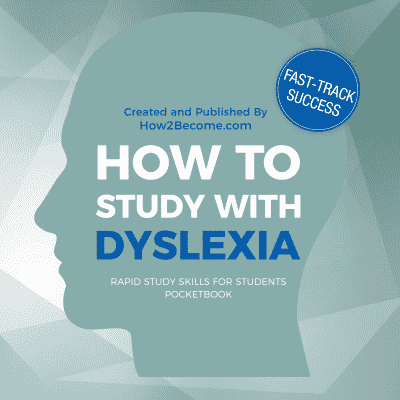Here, we’re going to take a look at what dyslexia is. Studying with dyslexia is difficult, so let’s get a deeper understand of what dyslexia is.
What is Dyslexia? – Studying With Dyslexia
‘Dyslexia’ is a specific learning difficulty that affects how people interact with words and numbers. For this reason, it can make studying difficult. Dyslexia inhibits reading comprehension. So, people with dyslexia have to work extremely hard to understand what they’re reading. It can also affect a student’s writing. Again, dyslexics will usually have to work a lot harder to put sentences together than non-dyslexics. Despite this, dyslexia is not categorised as a disability because it has no relationship with intelligence.
This difficulty with reading and writing stems from the fact that dyslexia interferes with the ability to ‘decode’ words and sentences. This means that you may struggle to identify the relationship between the letters used to spell a word. Dyslexics might also struggle with the sounds that they represent. Also, it may prove a challenge for you to ‘break words down’ and get to grips with why some words are formed and spelled the way they are. It may be difficult for people with dyslexia to become aware of word structure. They also might find it hard to learn about word elements such as prefixes or suffixes.

Be Wary of Miracle Cures – Studying With Dyslexia
Alongside these elements, dyslexic students may have difficulty dealing with text appearing on brightly-coloured paper, which may cause visual disturbances. To counter this, dyslexic students may benefit from placing colourful filters over their reading material. This may help to stop the words seeming to move around or vibrate. Despite this, recent studies have doubted claims that dyslexia interferes with vison in this way, suggesting that it is only a language-based condition. So, be careful of any miraculous products that claim to ‘cure’ dyslexia – just do what works best for you.
While struggles with reading and spelling are what everyone thinks of when they hear the word ‘dyslexia’, there is more to it than that. People with dyslexia are also affected in many other ways. For example, you may have more difficulty understanding and following instructions, even verbally, or struggle to organise and plan assignments.
Also, when it comes to revising for exams, dyslexia can affect your ability to retain information you’ve learned due to the fact that it may inhibit short-term memory. Usually, however, long-term memory will not be affected. So, revising in ways that you know work for you will still yield good results.
Aside from this, there are symptoms that affect other areas of life, such as one’s spatial abilities. This could vary from having difficulty with sense of direction, or being slower when it comes to telling left from right. What’s more, all of these aspects of dyslexia often combine to affect self-esteem, which is often lower among dyslexics than non-dyslexics.
Conclusion – Studying With Dyslexia
Dyslexia affects people differently – symptoms can manifest themselves to varying degrees of severity or not appear at all. This can make dyslexia difficult to identify, as symptoms may go unnoticed or be written off as simply being a part of growing up. If you want to know more about studying with dyslexia, check out our pocketbook guide: How to Study With Dyslexia.

If you’d rather listen to this book than read it, we understand. Check out the How to Study With Dyslexia Audiobook.

